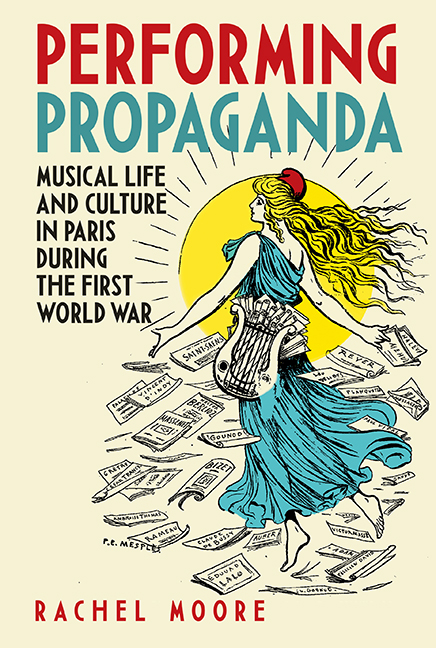 Performing Propaganda: Musical Life and Culture in Paris during the First World War
Performing Propaganda: Musical Life and Culture in Paris during the First World War Published online by Cambridge University Press: 19 July 2019
‘Paris sans théâtre ne serait plus Paris’
IN EARLY March 1918, mid-way through Act I of a matinée performance of Jacques Offenbach's Les contes d'Hoffmann at the Théâtre de l'Opéra-Comique, a distant humming mingles with the singing on stage. Progressively louder, the noise ominously announces the arrival of an enemy Gotha. A plane flies over Paris and a loud explosion reverberates in the rue Favart, just metres from the theatre. The Salle is silent: audience and performers wait together in anticipation of more explosions. Then, in the half-dark, the audience is shepherded calmly down to the cellar that serves as an air-raid shelter. After an interruption of some minutes – during which members of the audience might have passed comment on the audacity of the enemy for interrupting yet another performance – the orchestra strikes up a rousing ‘Marseillaise’ and the performance resumes to an electrified audience, as though nothing out of the ordinary has occurred. For the Parisian theatregoer of 1914–1918, such unscheduled intermissions were common: the above anecdote is an example of just one of many disruptions to musical life on the home front. Having desperately fought to keep his theatre open throughout the period, director Pierre-Barthélemy Gheusi would have known only too well the administrative and practical obstacles that had to be overcome to stage a successful performance in an environment where warfare constantly threatened to spill onto the home front. Air raids such as those experienced by the audience at the Opéra-Comique were just one of many ways in which daily life in the capital city would be rudely interrupted by events unfolding on the world stage.
Just under four years earlier, the people of Paris had once again found themselves at war with Germany. With the government declaring a state of siege reminiscent of the previous conflict between the two countries in 1870, by 31 August 1914 the German army had crossed the Belgian border and was at the doors of Paris. Two days later, enemy planes dropped their first Parisian bombs, causing the government to exit under cover of night to seek sanctuary in Bordeaux, and precipitating a mass exodus of civilians to the provinces. With another large segment of the population mobilised at the fighting fronts, the deserted capital had the air of a morgue. Paris, the ‘City of Light’, had become a city of darkness, as everyday existence appeared suspended.
To save this book to your Kindle, first ensure [email protected] is added to your Approved Personal Document E-mail List under your Personal Document Settings on the Manage Your Content and Devices page of your Amazon account. Then enter the ‘name’ part of your Kindle email address below. Find out more about saving to your Kindle.
Note you can select to save to either the @free.kindle.com or @kindle.com variations. ‘@free.kindle.com’ emails are free but can only be saved to your device when it is connected to wi-fi. ‘@kindle.com’ emails can be delivered even when you are not connected to wi-fi, but note that service fees apply.
Find out more about the Kindle Personal Document Service.
To save content items to your account, please confirm that you agree to abide by our usage policies. If this is the first time you use this feature, you will be asked to authorise Cambridge Core to connect with your account. Find out more about saving content to Dropbox.
To save content items to your account, please confirm that you agree to abide by our usage policies. If this is the first time you use this feature, you will be asked to authorise Cambridge Core to connect with your account. Find out more about saving content to Google Drive.